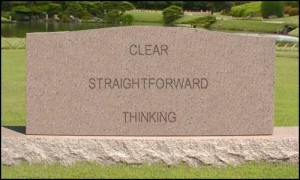Is it wrong to be resistant to opposing Anti-supernaturalism? Or not?
 I recently had a discussion with a real Christian. I was pleased we were able to express our views and really learn about each other. She asked if she could send me a book. I, of course, said yes.
I recently had a discussion with a real Christian. I was pleased we were able to express our views and really learn about each other. She asked if she could send me a book. I, of course, said yes.
It was a book on Christian apologetics. The first chapter warned Christians about the “anti-supernatural bias” they might encounter when discussing the Bible with nonbelievers. This term was new to me. The first thing that struck me was that the “anti” and the “super” cancel each other out. What they were objecting to was a bias for “naturalism”, the basis for science and a modern worldview. This is like objecting to being anti-magic or anti-evil. We normally simply say “rational” or “good”. Framing it this way is obfuscatory and subtly pejorative, as if the starting point is the supernatural and nonbelievers are wrong to refute it. Through the Looking Glass stuff.
Next, I googled “anti-supernatural bias” and was surprised to see it had been the subject of 135,000 other searches. Here’s a typical reference:
“Defenders of Christianity often complain that non-believers approach apologetic arguments with an “anti-supernatural bias,” an unsavory obstacle which clouds the non-believer’s judgment with inherently anti-theistic leanings. It is because of this bias that arguments in defense of Christianity are not given a fair hearing. This prejudice against “the supernatural,” is very real and very widespread. As one believer puts it, “’There is also an unwarranted anti-supernatural bias in academia and elsewhere which causes many to dismiss certain Christian doctrines without a fair consideration’.”
First, it is easy to see what psychologists call motivated reasoning here. Christians object when their supernatural claims are not taken seriously, but they themselves don’t take the supernatural claims of other religions seriously. They are making a general argument, but only for themselves. They undermine the point they are trying to make, which is that supernatural claims deserve fair consideration.
Second, I am not aware of an instance where science has dismissed anything without fair consideration. Science tries hard to identify and compensate for biases in gathering data. Further, there is a huge body of research about ESP, UFOs, paranormal phenomena, near-death experiences, parthenogenesis, the efficacy of prayer, etc. It would be hard to find an area that has not been the subject of a legitimate study. Scientists are extremely open-minded. This is easy to see in theoretical physics. There are some seriously whacked-out ideas in that field. They are entertained because we are trying so hard to make sense of the data. The data drives all of it.
The term “anti-supernatural bias” made me wonder if there are biases in science or academia and whether they are warranted. Apologetic Christians seem to want the luster of rational consistency for their supernatural claims. Wikipedia has this to say about the supernatural:
“Characteristic for phenomena claimed as supernatural are anomaly, uniqueness and uncontrollability, thus lacking reproducibility required for scientific examination.”
By definition, then, supernatural phenomena are outside the realm of science. If science ignores anything, it is not because of a bias, but because the area has made itself inaccessible to science. Supernatural phenomena fall into this category. I’d love to investigate the supposed resurrection of Christ, but there is no data to investigate, only conflicting second-hand accounts in ancient texts. There is no way to reproduce the event. Christians present no physical evidence and claim that it was unique in the universe. Claims like this have to be filed under “awaiting further evidence”. If we ignore them, it is because there are so many vibrant phenomena going on all around us that we lose interest in such extraordinary and unreproducible claims.
It is very important to realize that subjective experience is not evidence. If it were, then anything ever imagined would have to be given equal consideration. Gnomes, goblins, fairies, elves, zombies, monsters, sprites and the various pantheons of dead gods would all get funding for research. It is not a bias to require more evidence than a person’s subjective experience in order to take something seriously. It is reasonable. What is unreasonable is the expectation of the world’s religious believers that we should give every bizarre detail of their theologies a fair hearing. If they have nothing more than their wishful thinking to support their claims, we have no reason to take them seriously. And neither do they.


Recent Comments